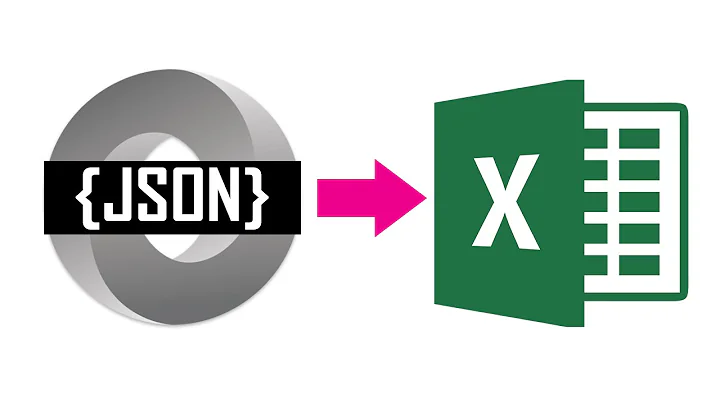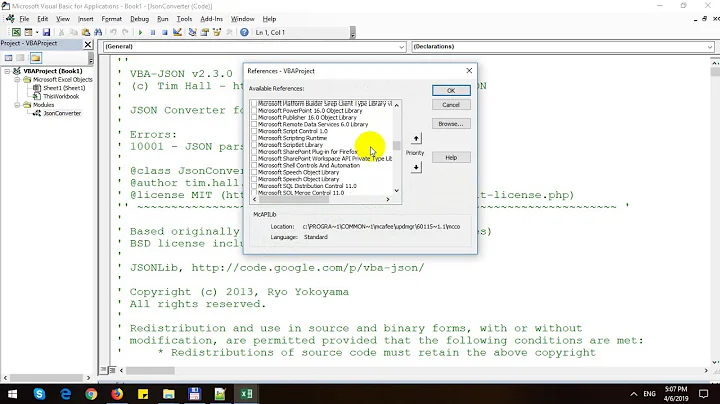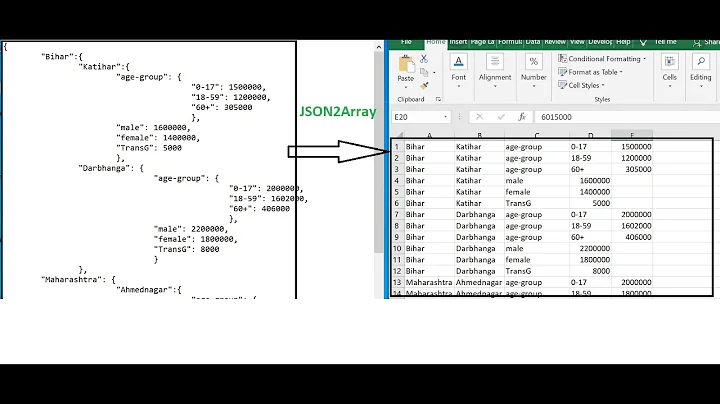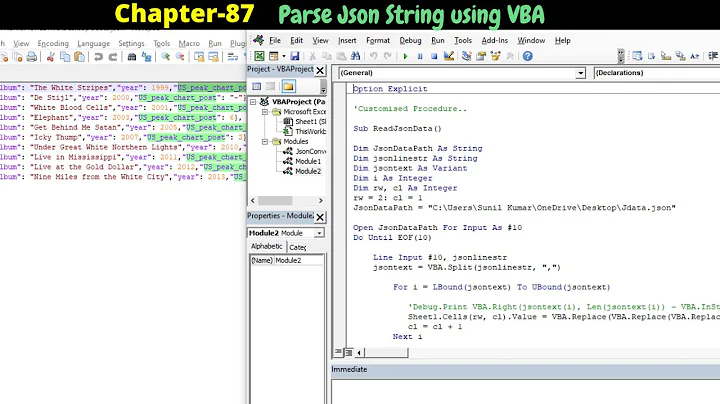Parsing JSON in Excel VBA
Solution 1
If you want to build on top of ScriptControl, you can add a few helper method to get at the required information. The JScriptTypeInfo object is a bit unfortunate: it contains all the relevant information (as you can see in the Watch window) but it seems impossible to get at it with VBA. However, the Javascript engine can help us:
Option Explicit
Private ScriptEngine As ScriptControl
Public Sub InitScriptEngine()
Set ScriptEngine = New ScriptControl
ScriptEngine.Language = "JScript"
ScriptEngine.AddCode "function getProperty(jsonObj, propertyName) { return jsonObj[propertyName]; } "
ScriptEngine.AddCode "function getKeys(jsonObj) { var keys = new Array(); for (var i in jsonObj) { keys.push(i); } return keys; } "
End Sub
Public Function DecodeJsonString(ByVal JsonString As String)
Set DecodeJsonString = ScriptEngine.Eval("(" + JsonString + ")")
End Function
Public Function GetProperty(ByVal JsonObject As Object, ByVal propertyName As String) As Variant
GetProperty = ScriptEngine.Run("getProperty", JsonObject, propertyName)
End Function
Public Function GetObjectProperty(ByVal JsonObject As Object, ByVal propertyName As String) As Object
Set GetObjectProperty = ScriptEngine.Run("getProperty", JsonObject, propertyName)
End Function
Public Function GetKeys(ByVal JsonObject As Object) As String()
Dim Length As Integer
Dim KeysArray() As String
Dim KeysObject As Object
Dim Index As Integer
Dim Key As Variant
Set KeysObject = ScriptEngine.Run("getKeys", JsonObject)
Length = GetProperty(KeysObject, "length")
ReDim KeysArray(Length - 1)
Index = 0
For Each Key In KeysObject
KeysArray(Index) = Key
Index = Index + 1
Next
GetKeys = KeysArray
End Function
Public Sub TestJsonAccess()
Dim JsonString As String
Dim JsonObject As Object
Dim Keys() As String
Dim Value As Variant
Dim j As Variant
InitScriptEngine
JsonString = "{""key1"": ""val1"", ""key2"": { ""key3"": ""val3"" } }"
Set JsonObject = DecodeJsonString(CStr(JsonString))
Keys = GetKeys(JsonObject)
Value = GetProperty(JsonObject, "key1")
Set Value = GetObjectProperty(JsonObject, "key2")
End Sub
A few notes:
- If the
JScriptTypeInfoinstance refers to a Javascript object,For Each ... Nextwon't work. However, it does work if it refers to a Javascript array (seeGetKeysfunction). - The access properties whose name is only known at run-time, use the functions
GetPropertyandGetObjectProperty. - The Javascript array provides the properties
length,0,Item 0,1,Item 1etc. With the VBA dot notation (jsonObject.property), only the length property is accessible and only if you declare a variable calledlengthwith all lowercase letters. Otherwise the case doesn't match and it won't find it. The other properties are not valid in VBA. So better use theGetPropertyfunction. - The code uses early binding. So you have to add a reference to "Microsoft Script Control 1.0".
- You have to call
InitScriptEngineonce before using the other functions to do some basic initialization.
Solution 2
UPDATE 3 (Sep 24 '17)
Check VBA-JSON-parser on GitHub for the latest version and examples. Import JSON.bas module into the VBA project for JSON processing.
UPDATE 2 (Oct 1 '16)
However if you do want to parse JSON on 64-bit Office with ScriptControl, then this answer may help you to get ScriptControl to work on 64-bit.
UPDATE (Oct 26 '15)
Note that a ScriptControl-based approachs makes the system vulnerable in some cases, since they allows a direct access to the drives (and other stuff) for the malicious JS code via ActiveX's. Let's suppose you are parsing web server response JSON, like JsonString = "{a:(function(){(new ActiveXObject('Scripting.FileSystemObject')).CreateTextFile('C:\\Test.txt')})()}". After evaluating it you'll find new created file C:\Test.txt. So JSON parsing with ScriptControl ActiveX is not a good idea.
Trying to avoid that, I've created JSON parser based on RegEx's. Objects {} are represented by dictionaries, that makes possible to use dictionary's properties and methods: .Count, .Exists(), .Item(), .Items, .Keys. Arrays [] are the conventional zero-based VB arrays, so UBound() shows the number of elements. Here is the code with some usage examples:
Option Explicit
Sub JsonTest()
Dim strJsonString As String
Dim varJson As Variant
Dim strState As String
Dim varItem As Variant
' parse JSON string to object
' root element can be the object {} or the array []
strJsonString = "{""a"":[{}, 0, ""value"", [{""stuff"":""content""}]], b:null}"
ParseJson strJsonString, varJson, strState
' checking the structure step by step
Select Case False ' if any of the checks is False, the sequence is interrupted
Case IsObject(varJson) ' if root JSON element is object {},
Case varJson.Exists("a") ' having property a,
Case IsArray(varJson("a")) ' which is array,
Case UBound(varJson("a")) >= 3 ' having not less than 4 elements,
Case IsArray(varJson("a")(3)) ' where forth element is array,
Case UBound(varJson("a")(3)) = 0 ' having the only element,
Case IsObject(varJson("a")(3)(0)) ' which is object,
Case varJson("a")(3)(0).Exists("stuff") ' having property stuff,
Case Else
MsgBox "Check the structure step by step" & vbCrLf & varJson("a")(3)(0)("stuff") ' then show the value of the last one property.
End Select
' direct access to the property if sure of structure
MsgBox "Direct access to the property" & vbCrLf & varJson.Item("a")(3)(0).Item("stuff") ' content
' traversing each element in array
For Each varItem In varJson("a")
' show the structure of the element
MsgBox "The structure of the element:" & vbCrLf & BeautifyJson(varItem)
Next
' show the full structure starting from root element
MsgBox "The full structure starting from root element:" & vbCrLf & BeautifyJson(varJson)
End Sub
Sub BeautifyTest()
' put sourse JSON string to "desktop\source.json" file
' processed JSON will be saved to "desktop\result.json" file
Dim strDesktop As String
Dim strJsonString As String
Dim varJson As Variant
Dim strState As String
Dim strResult As String
Dim lngIndent As Long
strDesktop = CreateObject("WScript.Shell").SpecialFolders.Item("Desktop")
strJsonString = ReadTextFile(strDesktop & "\source.json", -2)
ParseJson strJsonString, varJson, strState
If strState <> "Error" Then
strResult = BeautifyJson(varJson)
WriteTextFile strResult, strDesktop & "\result.json", -1
End If
CreateObject("WScript.Shell").PopUp strState, 1, , 64
End Sub
Sub ParseJson(ByVal strContent As String, varJson As Variant, strState As String)
' strContent - source JSON string
' varJson - created object or array to be returned as result
' strState - Object|Array|Error depending on processing to be returned as state
Dim objTokens As Object
Dim objRegEx As Object
Dim bMatched As Boolean
Set objTokens = CreateObject("Scripting.Dictionary")
Set objRegEx = CreateObject("VBScript.RegExp")
With objRegEx
' specification http://www.json.org/
.Global = True
.MultiLine = True
.IgnoreCase = True
.Pattern = """(?:\\""|[^""])*""(?=\s*(?:,|\:|\]|\}))"
Tokenize objTokens, objRegEx, strContent, bMatched, "str"
.Pattern = "(?:[+-])?(?:\d+\.\d*|\.\d+|\d+)e(?:[+-])?\d+(?=\s*(?:,|\]|\}))"
Tokenize objTokens, objRegEx, strContent, bMatched, "num"
.Pattern = "(?:[+-])?(?:\d+\.\d*|\.\d+|\d+)(?=\s*(?:,|\]|\}))"
Tokenize objTokens, objRegEx, strContent, bMatched, "num"
.Pattern = "\b(?:true|false|null)(?=\s*(?:,|\]|\}))"
Tokenize objTokens, objRegEx, strContent, bMatched, "cst"
.Pattern = "\b[A-Za-z_]\w*(?=\s*\:)" ' unspecified name without quotes
Tokenize objTokens, objRegEx, strContent, bMatched, "nam"
.Pattern = "\s"
strContent = .Replace(strContent, "")
.MultiLine = False
Do
bMatched = False
.Pattern = "<\d+(?:str|nam)>\:<\d+(?:str|num|obj|arr|cst)>"
Tokenize objTokens, objRegEx, strContent, bMatched, "prp"
.Pattern = "\{(?:<\d+prp>(?:,<\d+prp>)*)?\}"
Tokenize objTokens, objRegEx, strContent, bMatched, "obj"
.Pattern = "\[(?:<\d+(?:str|num|obj|arr|cst)>(?:,<\d+(?:str|num|obj|arr|cst)>)*)?\]"
Tokenize objTokens, objRegEx, strContent, bMatched, "arr"
Loop While bMatched
.Pattern = "^<\d+(?:obj|arr)>$" ' unspecified top level array
If Not (.Test(strContent) And objTokens.Exists(strContent)) Then
varJson = Null
strState = "Error"
Else
Retrieve objTokens, objRegEx, strContent, varJson
strState = IIf(IsObject(varJson), "Object", "Array")
End If
End With
End Sub
Sub Tokenize(objTokens, objRegEx, strContent, bMatched, strType)
Dim strKey As String
Dim strRes As String
Dim lngCopyIndex As Long
Dim objMatch As Object
strRes = ""
lngCopyIndex = 1
With objRegEx
For Each objMatch In .Execute(strContent)
strKey = "<" & objTokens.Count & strType & ">"
bMatched = True
With objMatch
objTokens(strKey) = .Value
strRes = strRes & Mid(strContent, lngCopyIndex, .FirstIndex - lngCopyIndex + 1) & strKey
lngCopyIndex = .FirstIndex + .Length + 1
End With
Next
strContent = strRes & Mid(strContent, lngCopyIndex, Len(strContent) - lngCopyIndex + 1)
End With
End Sub
Sub Retrieve(objTokens, objRegEx, strTokenKey, varTransfer)
Dim strContent As String
Dim strType As String
Dim objMatches As Object
Dim objMatch As Object
Dim strName As String
Dim varValue As Variant
Dim objArrayElts As Object
strType = Left(Right(strTokenKey, 4), 3)
strContent = objTokens(strTokenKey)
With objRegEx
.Global = True
Select Case strType
Case "obj"
.Pattern = "<\d+\w{3}>"
Set objMatches = .Execute(strContent)
Set varTransfer = CreateObject("Scripting.Dictionary")
For Each objMatch In objMatches
Retrieve objTokens, objRegEx, objMatch.Value, varTransfer
Next
Case "prp"
.Pattern = "<\d+\w{3}>"
Set objMatches = .Execute(strContent)
Retrieve objTokens, objRegEx, objMatches(0).Value, strName
Retrieve objTokens, objRegEx, objMatches(1).Value, varValue
If IsObject(varValue) Then
Set varTransfer(strName) = varValue
Else
varTransfer(strName) = varValue
End If
Case "arr"
.Pattern = "<\d+\w{3}>"
Set objMatches = .Execute(strContent)
Set objArrayElts = CreateObject("Scripting.Dictionary")
For Each objMatch In objMatches
Retrieve objTokens, objRegEx, objMatch.Value, varValue
If IsObject(varValue) Then
Set objArrayElts(objArrayElts.Count) = varValue
Else
objArrayElts(objArrayElts.Count) = varValue
End If
varTransfer = objArrayElts.Items
Next
Case "nam"
varTransfer = strContent
Case "str"
varTransfer = Mid(strContent, 2, Len(strContent) - 2)
varTransfer = Replace(varTransfer, "\""", """")
varTransfer = Replace(varTransfer, "\\", "\")
varTransfer = Replace(varTransfer, "\/", "/")
varTransfer = Replace(varTransfer, "\b", Chr(8))
varTransfer = Replace(varTransfer, "\f", Chr(12))
varTransfer = Replace(varTransfer, "\n", vbLf)
varTransfer = Replace(varTransfer, "\r", vbCr)
varTransfer = Replace(varTransfer, "\t", vbTab)
.Global = False
.Pattern = "\\u[0-9a-fA-F]{4}"
Do While .Test(varTransfer)
varTransfer = .Replace(varTransfer, ChrW(("&H" & Right(.Execute(varTransfer)(0).Value, 4)) * 1))
Loop
Case "num"
varTransfer = Evaluate(strContent)
Case "cst"
Select Case LCase(strContent)
Case "true"
varTransfer = True
Case "false"
varTransfer = False
Case "null"
varTransfer = Null
End Select
End Select
End With
End Sub
Function BeautifyJson(varJson As Variant) As String
Dim strResult As String
Dim lngIndent As Long
BeautifyJson = ""
lngIndent = 0
BeautyTraverse BeautifyJson, lngIndent, varJson, vbTab, 1
End Function
Sub BeautyTraverse(strResult As String, lngIndent As Long, varElement As Variant, strIndent As String, lngStep As Long)
Dim arrKeys() As Variant
Dim lngIndex As Long
Dim strTemp As String
Select Case VarType(varElement)
Case vbObject
If varElement.Count = 0 Then
strResult = strResult & "{}"
Else
strResult = strResult & "{" & vbCrLf
lngIndent = lngIndent + lngStep
arrKeys = varElement.Keys
For lngIndex = 0 To UBound(arrKeys)
strResult = strResult & String(lngIndent, strIndent) & """" & arrKeys(lngIndex) & """" & ": "
BeautyTraverse strResult, lngIndent, varElement(arrKeys(lngIndex)), strIndent, lngStep
If Not (lngIndex = UBound(arrKeys)) Then strResult = strResult & ","
strResult = strResult & vbCrLf
Next
lngIndent = lngIndent - lngStep
strResult = strResult & String(lngIndent, strIndent) & "}"
End If
Case Is >= vbArray
If UBound(varElement) = -1 Then
strResult = strResult & "[]"
Else
strResult = strResult & "[" & vbCrLf
lngIndent = lngIndent + lngStep
For lngIndex = 0 To UBound(varElement)
strResult = strResult & String(lngIndent, strIndent)
BeautyTraverse strResult, lngIndent, varElement(lngIndex), strIndent, lngStep
If Not (lngIndex = UBound(varElement)) Then strResult = strResult & ","
strResult = strResult & vbCrLf
Next
lngIndent = lngIndent - lngStep
strResult = strResult & String(lngIndent, strIndent) & "]"
End If
Case vbInteger, vbLong, vbSingle, vbDouble
strResult = strResult & varElement
Case vbNull
strResult = strResult & "Null"
Case vbBoolean
strResult = strResult & IIf(varElement, "True", "False")
Case Else
strTemp = Replace(varElement, "\""", """")
strTemp = Replace(strTemp, "\", "\\")
strTemp = Replace(strTemp, "/", "\/")
strTemp = Replace(strTemp, Chr(8), "\b")
strTemp = Replace(strTemp, Chr(12), "\f")
strTemp = Replace(strTemp, vbLf, "\n")
strTemp = Replace(strTemp, vbCr, "\r")
strTemp = Replace(strTemp, vbTab, "\t")
strResult = strResult & """" & strTemp & """"
End Select
End Sub
Function ReadTextFile(strPath As String, lngFormat As Long) As String
' lngFormat -2 - System default, -1 - Unicode, 0 - ASCII
With CreateObject("Scripting.FileSystemObject").OpenTextFile(strPath, 1, False, lngFormat)
ReadTextFile = ""
If Not .AtEndOfStream Then ReadTextFile = .ReadAll
.Close
End With
End Function
Sub WriteTextFile(strContent As String, strPath As String, lngFormat As Long)
With CreateObject("Scripting.FileSystemObject").OpenTextFile(strPath, 2, True, lngFormat)
.Write (strContent)
.Close
End With
End Sub
One more opportunity of this JSON RegEx parser is that it works on 64-bit Office, where ScriptControl isn't available.
INITIAL (May 27 '15)
Here is one more method to parse JSON in VBA, based on ScriptControl ActiveX, without external libraries:
Sub JsonTest()
Dim Dict, Temp, Text, Keys, Items
' Converting JSON string to appropriate nested dictionaries structure
' Dictionaries have numeric keys for JSON Arrays, and string keys for JSON Objects
' Returns Nothing in case of any JSON syntax issues
Set Dict = GetJsonDict("{a:[[{stuff:'result'}]], b:''}")
' You can use For Each ... Next and For ... Next loops through keys and items
Keys = Dict.Keys
Items = Dict.Items
' Referring directly to the necessary property if sure, without any checks
MsgBox Dict("a")(0)(0)("stuff")
' Auxiliary DrillDown() function
' Drilling down the structure, sequentially checking if each level exists
Select Case False
Case DrillDown(Dict, "a", Temp, "")
Case DrillDown(Temp, 0, Temp, "")
Case DrillDown(Temp, 0, Temp, "")
Case DrillDown(Temp, "stuff", "", Text)
Case Else
' Structure is consistent, requested value found
MsgBox Text
End Select
End Sub
Function GetJsonDict(JsonString As String)
With CreateObject("ScriptControl")
.Language = "JScript"
.ExecuteStatement "function gettype(sample) {return {}.toString.call(sample).slice(8, -1)}"
.ExecuteStatement "function evaljson(json, er) {try {var sample = eval('(' + json + ')'); var type = gettype(sample); if(type != 'Array' && type != 'Object') {return er;} else {return getdict(sample);}} catch(e) {return er;}}"
.ExecuteStatement "function getdict(sample) {var type = gettype(sample); if(type != 'Array' && type != 'Object') return sample; var dict = new ActiveXObject('Scripting.Dictionary'); if(type == 'Array') {for(var key = 0; key < sample.length; key++) {dict.add(key, getdict(sample[key]));}} else {for(var key in sample) {dict.add(key, getdict(sample[key]));}} return dict;}"
Set GetJsonDict = .Run("evaljson", JsonString, Nothing)
End With
End Function
Function DrillDown(Source, Prop, Target, Value)
Select Case False
Case TypeName(Source) = "Dictionary"
Case Source.exists(Prop)
Case Else
Select Case True
Case TypeName(Source(Prop)) = "Dictionary"
Set Target = Source(Prop)
Value = Empty
Case IsObject(Source(Prop))
Set Value = Source(Prop)
Set Target = Nothing
Case Else
Value = Source(Prop)
Set Target = Nothing
End Select
DrillDown = True
Exit Function
End Select
DrillDown = False
End Function
Solution 3
As Json is nothing but strings so it can easily be handled if we can manipulate it the right way, no matter how complex the structure is. I don't think it is necessary to use any external library or converter to do the trick. Here is an example where I've parsed json data using string manipulation.
Sub FetchData()
Dim str As Variant, N&, R&
With New XMLHTTP60
.Open "GET", "https://oresapp.asicanada.net/ores.imis.services/api/member/?address=&callback=angular.callbacks._0&city=&companyName=&personName=", False
.send
str = Split(.responseText, ":[{""Id"":")
End With
N = UBound(str)
For R = 1 To N
Cells(R, 1) = Split(Split(str(R), "FullName"":""")(1), """")(0)
Cells(R, 2) = Split(Split(str(R), "Phone"":""")(1), """")(0)
Cells(R, 3) = Split(Split(str(R), "Email"":""")(1), """")(0)
Next R
End Sub
Solution 4
To parse JSON in VBA without adding a huge library to your workbook project, I created the following solution. It's extremely fast and stores all of the keys and values in a dictionary for easy access:
Function ParseJSON(json$, Optional key$ = "obj") As Object
p = 1
token = Tokenize(json)
Set dic = CreateObject("Scripting.Dictionary")
If token(p) = "{" Then ParseObj key Else ParseArr key
Set ParseJSON = dic
End Function
Function ParseObj(key$)
Do: p = p + 1
Select Case token(p)
Case "]"
Case "[": ParseArr key
Case "{"
If token(p + 1) = "}" Then
p = p + 1
dic.Add key, "null"
Else
ParseObj key
End If
Case "}": key = ReducePath(key): Exit Do
Case ":": key = key & "." & token(p - 1)
Case ",": key = ReducePath(key)
Case Else: If token(p + 1) <> ":" Then dic.Add key, token(p)
End Select
Loop
End Function
Function ParseArr(key$)
Dim e&
Do: p = p + 1
Select Case token(p)
Case "}"
Case "{": ParseObj key & ArrayID(e)
Case "[": ParseArr key
Case "]": Exit Do
Case ":": key = key & ArrayID(e)
Case ",": e = e + 1
Case Else: dic.Add key & ArrayID(e), token(p)
End Select
Loop
End Function
The code above does use a few helper functions, but the above is the meat of it.
The strategy used here is to employ a recursive tokenizer. I found it interesting enough to write an article about this solution on Medium. It explains the details.
Here is the full (yet surprisingly short) code listing, including all of the helper functions:
'-------------------------------------------------------------------
' VBA JSON Parser
'-------------------------------------------------------------------
Option Explicit
Private p&, token, dic
Function ParseJSON(json$, Optional key$ = "obj") As Object
p = 1
token = Tokenize(json)
Set dic = CreateObject("Scripting.Dictionary")
If token(p) = "{" Then ParseObj key Else ParseArr key
Set ParseJSON = dic
End Function
Function ParseObj(key$)
Do: p = p + 1
Select Case token(p)
Case "]"
Case "[": ParseArr key
Case "{"
If token(p + 1) = "}" Then
p = p + 1
dic.Add key, "null"
Else
ParseObj key
End If
Case "}": key = ReducePath(key): Exit Do
Case ":": key = key & "." & token(p - 1)
Case ",": key = ReducePath(key)
Case Else: If token(p + 1) <> ":" Then dic.Add key, token(p)
End Select
Loop
End Function
Function ParseArr(key$)
Dim e&
Do: p = p + 1
Select Case token(p)
Case "}"
Case "{": ParseObj key & ArrayID(e)
Case "[": ParseArr key
Case "]": Exit Do
Case ":": key = key & ArrayID(e)
Case ",": e = e + 1
Case Else: dic.Add key & ArrayID(e), token(p)
End Select
Loop
End Function
'-------------------------------------------------------------------
' Support Functions
'-------------------------------------------------------------------
Function Tokenize(s$)
Const Pattern = """(([^""\\]|\\.)*)""|[+\-]?(?:0|[1-9]\d*)(?:\.\d*)?(?:[eE][+\-]?\d+)?|\w+|[^\s""']+?"
Tokenize = RExtract(s, Pattern, True)
End Function
Function RExtract(s$, Pattern, Optional bGroup1Bias As Boolean, Optional bGlobal As Boolean = True)
Dim c&, m, n, v
With CreateObject("vbscript.regexp")
.Global = bGlobal
.MultiLine = False
.IgnoreCase = True
.Pattern = Pattern
If .TEST(s) Then
Set m = .Execute(s)
ReDim v(1 To m.Count)
For Each n In m
c = c + 1
v(c) = n.value
If bGroup1Bias Then If Len(n.submatches(0)) Or n.value = """""" Then v(c) = n.submatches(0)
Next
End If
End With
RExtract = v
End Function
Function ArrayID$(e)
ArrayID = "(" & e & ")"
End Function
Function ReducePath$(key$)
If InStr(key, ".") Then ReducePath = Left(key, InStrRev(key, ".") - 1)
End Function
Function ListPaths(dic)
Dim s$, v
For Each v In dic
s = s & v & " --> " & dic(v) & vbLf
Next
Debug.Print s
End Function
Function GetFilteredValues(dic, match)
Dim c&, i&, v, w
v = dic.keys
ReDim w(1 To dic.Count)
For i = 0 To UBound(v)
If v(i) Like match Then
c = c + 1
w(c) = dic(v(i))
End If
Next
ReDim Preserve w(1 To c)
GetFilteredValues = w
End Function
Function GetFilteredTable(dic, cols)
Dim c&, i&, j&, v, w, z
v = dic.keys
z = GetFilteredValues(dic, cols(0))
ReDim w(1 To UBound(z), 1 To UBound(cols) + 1)
For j = 1 To UBound(cols) + 1
z = GetFilteredValues(dic, cols(j - 1))
For i = 1 To UBound(z)
w(i, j) = z(i)
Next
Next
GetFilteredTable = w
End Function
Function OpenTextFile$(f)
With CreateObject("ADODB.Stream")
.Charset = "utf-8"
.Open
.LoadFromFile f
OpenTextFile = .ReadText
End With
End Function
Solution 5
Simpler way you can go array.myitem(0) in VB code
my full answer here parse and stringify (serialize)
Use the 'this' object in js
ScriptEngine.AddCode "Object.prototype.myitem=function( i ) { return this[i] } ; "
Then you can go array.myitem(0)
Private ScriptEngine As ScriptControl
Public Sub InitScriptEngine()
Set ScriptEngine = New ScriptControl
ScriptEngine.Language = "JScript"
ScriptEngine.AddCode "Object.prototype.myitem=function( i ) { return this[i] } ; "
Set foo = ScriptEngine.Eval("(" + "[ 1234, 2345 ]" + ")") ' JSON array
Debug.Print foo.myitem(1) ' method case sensitive!
Set foo = ScriptEngine.Eval("(" + "{ ""key1"":23 , ""key2"":2345 }" + ")") ' JSON key value
Debug.Print foo.myitem("key1") ' WTF
End Sub
Related videos on Youtube
Bastan
Updated on July 05, 2022Comments
-
Bastan almost 2 years
I have the same issue as in Excel VBA: Parsed JSON Object Loop but cannot find any solution. My JSON has nested objects so suggested solution like VBJSON and vba-json do not work for me. I also fixed one of them to work properly but the result was a call stack overflow because of to many recursion of the doProcess function.
The best solution appears to be the jsonDecode function seen in the original post. It is very fast and highly effective; my object structure is all there in a generic VBA Object of type JScriptTypeInfo.
The issue at this point is that I cannot determine what will be the structure of the objects, therefore, I do not know beforehand the keys that will reside in each generic objects. I need to loop through the generic VBA Object to acquire the keys/properties.
If my parsing javascript function could trigger a VBA function or sub, that would be excellent.
-
 Tim Williams almost 13 yearsI remember your previous question, so it's interesting to see it back again. One question I would have is: let's say you succeed in parsing your JSON in VBA - how would you then use that "object" in VBA? You note that the JSON structure can be of any type, so how would you navigate the end result in VBA? My first thought might be to create a JScript which would parse the JSON (using eval or even one of the "better" existing libraries) and then iterate over the structure to produce a nested scripting dictionary-based object to pass back to VBA. What are you doing with your parsed JSON ?
Tim Williams almost 13 yearsI remember your previous question, so it's interesting to see it back again. One question I would have is: let's say you succeed in parsing your JSON in VBA - how would you then use that "object" in VBA? You note that the JSON structure can be of any type, so how would you navigate the end result in VBA? My first thought might be to create a JScript which would parse the JSON (using eval or even one of the "better" existing libraries) and then iterate over the structure to produce a nested scripting dictionary-based object to pass back to VBA. What are you doing with your parsed JSON ? -
 Tim Williams almost 13 yearsgithub.com/akaZorg/asp-xtreme-evolution/blob/master/app/core/… Might be useful
Tim Williams almost 13 yearsgithub.com/akaZorg/asp-xtreme-evolution/blob/master/app/core/… Might be useful -
Bastan almost 13 yearsI will create a sheet for each object and add the records on each row, creating the column if not already existing (appending in row1). Your suggested asp-xtreme-evoluton seems interesting. Was in the process of creating something very similar. I have been provided a fixed and almost working (I fixed the little "issue") of the vba-json class. We'll be using that for the moment. The working vba-json was provided by Randyr, the author of the related question.
-
Bastan almost 13 years@tim, my previous comment might not answer your question properly. I know that the structure is basically a list of tables with records. So I have an Object (key:value) representing the tables. The "key" is the table name and the value is an Array [] of the records which are Object (key:value). I don't know for a fact which table have been provided and which columns(fields) are available. For people that can't do without a strict structure, it is wild generic programing :-) no offense to anybody of course.
-
 Tim Williams almost 13 yearsMore easy to follow if the structures are similar but the "keys" are different. Out of interest where is the data coming from?
Tim Williams almost 13 yearsMore easy to follow if the structures are similar but the "keys" are different. Out of interest where is the data coming from? -
Bastan almost 13 yearsI generate the json based on user request.
-
scrat.squirrel almost 13 yearsDo you have access to .NET's namespace
System.Runtime.Serialization.Json? -
David Perry over 12 yearsPossible duplicate to stackoverflow.com/questions/2782076/…
-
-
 harryg almost 10 yearsThis answer seems what I want but I'm getting a
harryg almost 10 yearsThis answer seems what I want but I'm getting aobject variable not setwhen trying theDecodeJsonStringfunction. Are there any other references I need apart from Microsoft Script Control? -
Codo almost 10 yearsIf there was a missing reference, you'd get a different error message. On what line does the error occur? On what is the value of the variables used in that line?
-
 harryg almost 10 yearsIt occurs just after the line
harryg almost 10 yearsIt occurs just after the lineSet DecodeJsonString = ScriptEngine.Eval("(" + JsonString + ")"). TheJsonStringis just a plain json object. I've tried with a variety of Json objects and get the same error. -
Sai Avinash almost 9 yearsThe best ever answer . I have just completed a POC on how to call an JSON Restful service , parse the recieved json based on your answer and then displayed it in Excel . This was very well recieved by our clients. Thank you very much . +1 for this ..
-
dmc2005 almost 9 yearsI'm using your code but having problems returns part of a JSON string where there is no subkeys. I am getting an unescaped command deliminated value for the entire "table". Any ideas? JSON returns: {"id":"primary_site","algorithm":"cs","version":"02.05.50","name":"Primary Site","title":"Primary Site","last_modified":"2015-05-27T16:19:40.613Z","definition":[{"key":"site","name":"Primary Site","type":"INPUT"},{"key":"desc","name":"Description","type":"DESCRIPTION"}],"rows":[["C000","External upper lip"],["C001","External lower lip"],["C002","External lip, NOS"], etc..the "rows" is the issue
-
 Charles Wood over 8 yearsThese days I'd recommend JsonBag. Only one class, comes with documentation, and it's very easy to use.
Charles Wood over 8 yearsThese days I'd recommend JsonBag. Only one class, comes with documentation, and it's very easy to use. -
 omegastripes over 8 yearsNote that the above approach makes the system vulnerable in some cases, since it allows the direct access to the drives (and other stuff) for the malicious JS code via ActiveX's. Let's suppose you are parsing web server response JSON, like
omegastripes over 8 yearsNote that the above approach makes the system vulnerable in some cases, since it allows the direct access to the drives (and other stuff) for the malicious JS code via ActiveX's. Let's suppose you are parsing web server response JSON, likeJsonString = "{a:(function(){(new ActiveXObject('Scripting.FileSystemObject')).CreateTextFile('C:\\Test.txt')})()}". After evaluating it you'll find new created fileC:\Test.txt. So JSON parsing withScriptControlActiveX is not a good idea. Check the update of my answer for the RegEx-based JSON parser. -
 Admin almost 8 yearsThank you for posting this code. I have a multiple record JSON string, something like: {""key1"": ""val1"", ""key2"": { ""key3"": ""val3"" },"{""key1"": ""val11"", ""key2"": { ""key3"": ""val33"" } } Can you please advise how can I loop through all the records? Any help will be much appreciated.
Admin almost 8 yearsThank you for posting this code. I have a multiple record JSON string, something like: {""key1"": ""val1"", ""key2"": { ""key3"": ""val3"" },"{""key1"": ""val11"", ""key2"": { ""key3"": ""val33"" } } Can you please advise how can I loop through all the records? Any help will be much appreciated. -
bvj over 7 yearsI got your solution to work for VBScript by stripping out the types and initializing by using the following:
Set se = CreateObject("MSScriptControl.ScriptControl"). +1 Thanks! -
drgs almost 7 yearsThe second regex version is the craziest implementation I've seen so far. What's going on in that code? I have my own regex based parser (decode only), which I posted down below
-
 omegastripes about 6 yearsAdding third parameter
omegastripes about 6 yearsAdding third parameterSplit(<string>, <delimiter>, 2)within loop, where a single result is necessary, may improve performance. -
 QHarr about 6 yearsApologies for being dense but in the update version where are varJson, strState coming from? I seem them used but not where anything other than default value is assigned. Or is that the point? You are only interested in processing based on type?
QHarr about 6 yearsApologies for being dense but in the update version where are varJson, strState coming from? I seem them used but not where anything other than default value is assigned. Or is that the point? You are only interested in processing based on type? -
 omegastripes about 6 years@QHarr
omegastripes about 6 years@QHarrvarJsonandstrStateare passedByRef, values are assigned to them withinSub ParseJson(), and returned as the result of parsing. -
 QHarr about 6 years@omegastripes Silly me. I should have scrolled down. Thanks for clarifying.
QHarr about 6 years@omegastripes Silly me. I should have scrolled down. Thanks for clarifying. -
 QHarr almost 6 yearsHow does this work in a nested JSON structure with, for example, collections of dictionaries containing different datatypes?
QHarr almost 6 yearsHow does this work in a nested JSON structure with, for example, collections of dictionaries containing different datatypes? -
bvj almost 6 yearsGood question, @QHarr Perhaps a value class could be introduced that could be used to build out an object tree of the data. For example, if an opening brace is detected, then perform a subsequent parse.
-
 QHarr almost 6 yearsThank you for getting back to me!
QHarr almost 6 yearsThank you for getting back to me! -
MrXsquared about 5 yearsThis should be best answer. After trying for hours with other attempts I made this work within 10mins. Simple and effective. I want to note that this requires to add "Microsoft XML, V6" reference to work.
-
 Salman A over 4 years
Salman A over 4 yearsevalis evil. An example would be"{}), Evil(), ({""foo"":""bar""}". One solution is to add the code from Douglas Crockford's JSON library. It'll addJSON.parsefunction to the JScript environment. Then useScriptEngine.Run("JSON.parse", "{}, Evil(), {}")and it'll throw a parse error. -
 Excel Hero over 3 years@MrXsquared It's a naive approach, but it can work with some forms of very simple JSON. If it works in your scenario and you like it, have at it. Just be prepared to deal frequently with recursive JSON.
Excel Hero over 3 years@MrXsquared It's a naive approach, but it can work with some forms of very simple JSON. If it works in your scenario and you like it, have at it. Just be prepared to deal frequently with recursive JSON. -
rleir over 3 yearsThe VBA-JSON author has a drop-in Scripting.Dictionary replacement github.com/VBA-tools/VBA-Dictionary. You don't need Scripting runtime in that case. Thanks to @TimWilliams for this info.
-
 omegastripes over 3 years@rleir sure you can use VBA-Dictionary, this parser supports it since v1.703 commit
omegastripes over 3 years@rleir sure you can use VBA-Dictionary, this parser supports it since v1.703 commit -
 ashwani kumar over 2 yearsFirst of all, thank you, omegastripes, for writing this awesome JSON parse. @rleir is there a function in VBA-Dictionary that accepts string representation of JSON and returns the parsed Dictionary object? I need VBA-Dictionary since it is compatible with mac and windows. First, I tried using VBA-JSON but later found out that it does not work on mac.
ashwani kumar over 2 yearsFirst of all, thank you, omegastripes, for writing this awesome JSON parse. @rleir is there a function in VBA-Dictionary that accepts string representation of JSON and returns the parsed Dictionary object? I need VBA-Dictionary since it is compatible with mac and windows. First, I tried using VBA-JSON but later found out that it does not work on mac.





